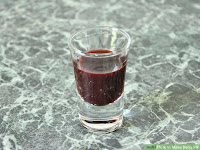Today we make quills. And other cool stuff. *theme tune starts playing*
First of all a crash course in the history of writing implements:
 There's no point making a quill if you have no ink! You could go buy calligraphy ink, or make your own. I personally prefer to make ink out of berries - it's fairly easy.
There's no point making a quill if you have no ink! You could go buy calligraphy ink, or make your own. I personally prefer to make ink out of berries - it's fairly easy.
~Hannah~
First of all a crash course in the history of writing implements:
4000 BC - hard tools on moist clay
3000 BC - reed brushes on papyrus (a type of reed woven and flattened)
1300 BC - metal stylus on thin sheets of wax
400 AD - metal stylus on thin sheets of wax, also wrote on parchment
600 - 1800 AD - quill pen on parchment (Pencil leads were invented in Australia and France but not used widely)
1800 - 1850 - steel nibs for quills emerges, metal pen patented
1884 - Fountain pen invented
1940s - Ball point pens (biros) were used widely
1960s - Felt tips invented
So Elizabethans. They included Shakespeare. Want to write like Shakespeare?
First things first: you need a pen. And some paper. And ink.
Make a Quill
For this you need a goose feather. Take a walk down to somewhere you know there are geese, like a lake. Take care to pick a feather big enough to write with, that's clean enough.
Wash the end that has been in the bird, and cut off the roundish end of the shaft, so you can clean out the dry membrane inside the shaft. Clear the barbs from the lower shaft; they'll get in the way.
To temper it (make it hard) find a tin can and fill it with sand. heat it up in the oven at gas mark 4 for 15 minutes or so.
Remove from the oven, taking care to not get burnt.
Stick the pointy end of the feather in the sand as far as it will go. Leave it until the sand cools off.
Start cutting your quill. You want it to look something like this:
An optional addition is wrapping string or leather around the shaft for better grip.
Make Ink
 There's no point making a quill if you have no ink! You could go buy calligraphy ink, or make your own. I personally prefer to make ink out of berries - it's fairly easy.
There's no point making a quill if you have no ink! You could go buy calligraphy ink, or make your own. I personally prefer to make ink out of berries - it's fairly easy.
First collect a handful of berries (blackberries make a nice purple, walnut makes a lovely brown, or buckthorn makes a dark turquoise color)
Put them through a strainer to get rid of the seeds and skin. You should be left with a kind of thick juice.
Add half a teaspoon of vinegar and half a teaspoon of salt. The vinegar is for color retention and the salt is to preserve it.
Pour the mixture into a small pot or jar. Baby food jars are good for this.
Put them through a strainer to get rid of the seeds and skin. You should be left with a kind of thick juice.
Add half a teaspoon of vinegar and half a teaspoon of salt. The vinegar is for color retention and the salt is to preserve it.
Pour the mixture into a small pot or jar. Baby food jars are good for this.
Make parchment
Find some A3 or A4 paper and rip off the edges. Make sure you don't rip into the middle. You could singe the edges instead, or in addition to this.
Crumple it up and then spread it onto a tray.
Pour tea or coffee over it and let it soak for about 5 minutes
Blowdry it. This makes the paper feel really old.
Now you can write with your awesome quill and ink!
~Hannah~




Comments